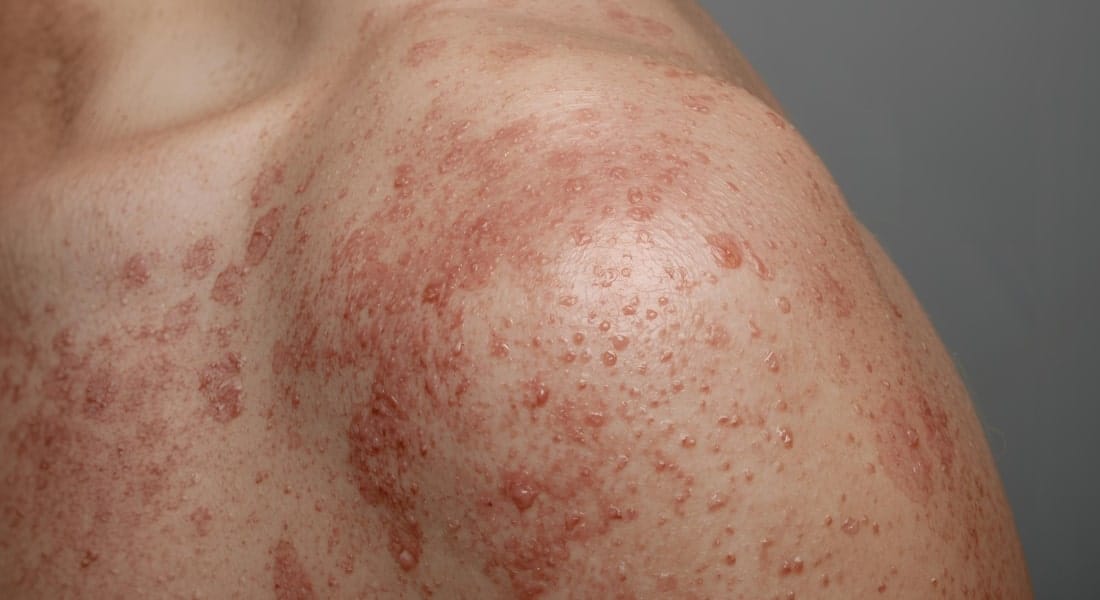Living with psoriasis is a daily challenge. As a chronic autoimmune condition, its symptoms can be unpredictable, ranging from mild irritation to severe, painful flare-ups that disrupt daily life. For many, managing psoriasis involves more than just a strict skincare routine and medication; it often requires a holistic approach that addresses triggers from within. This leads to a question many patients and clinicians are asking: Can what you eat truly influence the course of this disease?
The answer, supported by a growing body of scientific evidence, is a resounding yes. While diet and psoriasis isn’t a simple cure, it is a powerful complementary tool for managing psoriasis flare-ups. Certain foods and nutrients can either stoke the fires of inflammation or help calm the immune system, directly impacting psoriasis nutrition and overall skin health. This detailed guide, brought to you by Aakaar Medical Technologies Ltd, explores the profound link between what you eat and the state of your skin, offering science-backed insights and practical strategies to help you navigate your journey.
Understanding Psoriasis and Its Triggers
Psoriasis is not merely a skin condition; it’s an autoimmune disease. In a healthy person, the immune system defends the body against foreign invaders. In someone with psoriasis, the immune system mistakenly attacks healthy skin cells. This attack triggers a chain reaction that causes skin cells to grow at an abnormally rapid rate—a process that normally takes weeks is compressed into just a few days. The result is the characteristic buildup of thick, red patches covered in silvery scales. This constant state of heightened cell production is a direct consequence of chronic inflammation driven by an overactive immune system.
While the exact psoriasis causes are still under research, it’s widely understood that genetics play a significant role. However, genetics alone don’t dictate the disease’s course. Numerous psoriasis triggers can activate the condition or cause a flare-up in someone who is predisposed. Common triggers include:
- Stress: Psychological stress is a well-documented trigger for psoriasis flare-ups.
- Weather: Cold, dry weather can worsen symptoms.
- Infections: Strep throat and other infections can trigger a flare-up, particularly in children.
- Injury to the Skin: A cut, scrape, or sunburn can lead to a new patch of psoriasis (Koebner phenomenon).
- Medications: Certain medications, such as lithium and beta-blockers, are known to be psoriasis triggers.
- Lifestyle Factors: These include smoking, alcohol consumption, and, critically, diet.
Recognizing that lifestyle choices, including what you eat, are a controllable factor is the first step toward effective management of this chronic skin condition.
The Link Between Diet and Psoriasis
For a long time, the medical community viewed psoriasis as a purely dermatological issue. However, research over the last two decades has highlighted a profound psoriasis diet connection. This connection is rooted in the body’s inflammatory response. The foods we consume can either be pro-inflammatory or anti-inflammatory. An autoimmune disease, by its very nature, thrives on inflammation.

Studies have shown that individuals with psoriasis often have a higher incidence of inflammatory conditions like obesity, cardiovascular disease, and metabolic syndrome. These conditions are all linked to systemic inflammation, suggesting that what inflames the body internally can manifest externally on the skin. A key piece of this puzzle is the gut-skin axis. The gut microbiome—the trillions of bacteria living in your intestines—plays a crucial role in regulating your immune system. When the gut is unhealthy, often due to a poor diet, it can lead to a state of “leaky gut,” allowing inflammatory compounds to enter the bloodstream and travel to the skin, where they can trigger a psoriatic response.
This intricate link means that by altering your diet, you have the potential to modulate the inflammatory pathways and immune responses that drive psoriasis flare-ups. While no single food or diet is a guaranteed cure, focusing on specific food groups can be a powerful tool in your overall management plan.
Foods That May Worsen Psoriasis
To manage psoriasis flare-ups, it’s often as important to know what to avoid as what to embrace. The goal is to reduce foods that are known to promote inflammation, thereby minimizing the internal triggers that can lead to external symptoms. The worst foods for psoriasis are typically those high in pro-inflammatory compounds.
- Alcohol: Excessive alcohol consumption can act as a significant psoriasis trigger. It can increase inflammation, disrupt the gut barrier, and even interfere with the effectiveness of certain psoriasis medications.
- Red Meat and Processed Meats: These are high in arachidonic acid, an omega-6 fatty acid that can be converted into pro-inflammatory compounds in the body. Reducing intake of red meats like beef, pork, and lamb, as well as processed items like sausage and bacon, is often recommended.
- Processed Sugars and Refined Carbohydrates: Foods like sugary drinks, white bread, pastries, and candy cause rapid spikes in blood sugar and insulin levels, which can lead to systemic inflammation. These foods lack nutritional value and can fuel the inflammatory cycle.
- Dairy Products: For some people, dairy can be a psoriasis diet connection issue. The proteins in dairy, like casein, can be inflammatory for certain individuals. While not a trigger for everyone, eliminating or reducing dairy can be a helpful experiment to see if symptoms improve.
- Gluten: Some individuals with psoriasis also have a sensitivity to gluten. The protein found in wheat, barley, and rye can cause intestinal inflammation in sensitive individuals, which may lead to skin flare-ups. A gluten-free diet has been shown to benefit a subset of patients, particularly those who also have celiac disease.
By strategically limiting these foods that trigger psoriasis flare-ups, you can help reduce the overall inflammatory burden on your body and create an environment more conducive to skin health.
Foods That May Help Reduce Flare-Ups
While avoiding certain foods is important, a successful psoriasis diet is more about adding beneficial foods than just taking things away. The best diet for psoriasis is typically an anti-inflammatory one, focusing on nutrients that actively help calm the immune response.

- Anti-Inflammatory Diets: The Mediterranean diet is a prime example. It emphasizes fruits, vegetables, whole grains, lean protein (especially fish), and healthy fats from sources like olive oil and nuts. This dietary pattern provides a rich supply of antioxidants and anti-inflammatory foods.
- Omega-3 Fatty Acids: Omega-3s are powerful anti-inflammatory agents that can help regulate the immune system. Foods for psoriasis rich in omega-3s include fatty fish (salmon, mackerel, sardines), walnuts, and flaxseeds.
- Antioxidants: Found in vibrant fruits and vegetables, antioxidants like vitamins C and E and beta-carotene help protect the body’s cells from damage caused by inflammation. Load up on berries, leafy greens, carrots, and sweet potatoes.
- Vitamin D: This vitamin plays a key role in immune regulation and skin cell growth. While sunlight is the primary source, you can also get it from fortified foods and fatty fish.
- Probiotics: These beneficial bacteria, found in fermented foods like yogurt, kefir, and sauerkraut, help maintain a healthy gut microbiome. A balanced gut can lead to a more balanced immune response and better skin health.
Staying hydrated is also critical for psoriasis nutrition tips. Drinking plenty of water helps your body function optimally and keeps your skin moisturized from the inside out.
The Role of Skincare and Supplements Alongside Diet
While psoriasis nutrition is a powerful tool, it’s only one piece of a comprehensive psoriasis management plan. Effective care requires a holistic approach that combines a healthy lifestyle with professional dermatological guidance and medically-backed skincare products. A synergistic strategy that addresses the condition both internally and externally can yield the best results.
In addition to dietary management, Aakaar Medical Technologies Ltd offers the Tinefcon Range, developed to support patients with psoriasis both internally and externally. This innovative product line provides targeted solutions for various aspects of the disease:
- Tinefcon Tablets: These oral tablets are designed to provide systemic support by addressing the inflammatory processes from within, helping to calm the immune system’s overactive response.
- Tinefcon Cream: A topical solution for direct topical relief of inflamed and irritated skin patches. It provides soothing and restorative care to the affected areas.
- Tinefcon Scalp Cleanser: Specifically formulated for individuals with scalp psoriasis, this cleanser helps to gently remove scales and soothe the scalp while reducing inflammation.
- Tinefcon Skin Cleanser: A gentle, non-irritating daily skin care cleanser that is perfect for maintaining the skin barrier without causing dryness or irritation.
By integrating a mindful diet with these targeted products, patients can build a robust defense against psoriasis flare-ups.
Conclusion

The link between diet and psoriasis is undeniable, but it’s important to view diet as a complementary tool, not a cure. Making dietary changes can significantly reduce inflammation and support your immune system, leading to fewer and less severe psoriasis flare-ups. However, it is a highly personal journey. What works for one person may not work for another. It is crucial to pay attention to your body and work with a healthcare professional, such as a dermatologist and a registered dietitian, to develop a personalized plan.
By combining an anti-inflammatory diet for psoriasis with professional medical care, you can take proactive steps to manage your condition more effectively. Don’t hesitate to explore advanced, medically-backed solutions like the Tinefcon range from Aakaar Medical Technologies Ltd to support your skin’s health, both from the inside out and the outside in.

